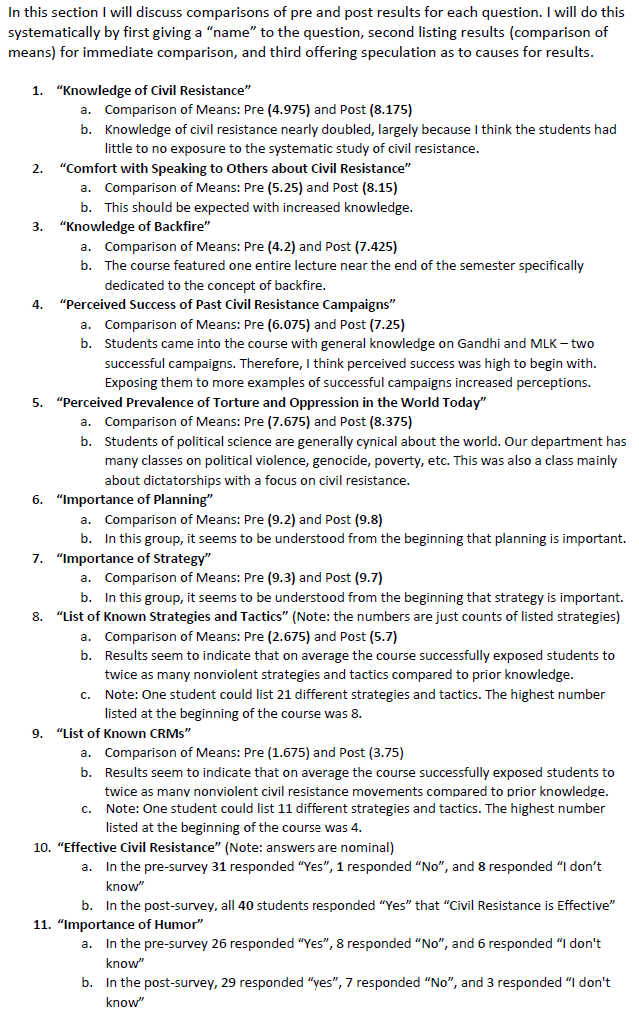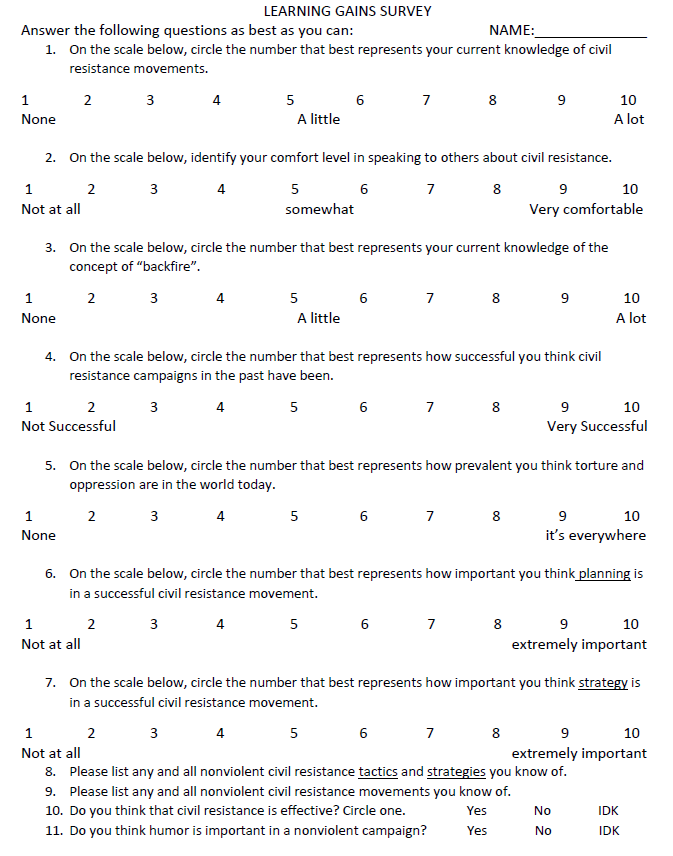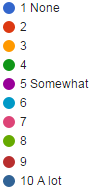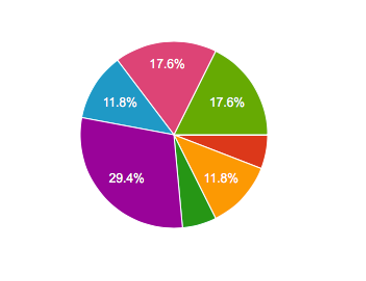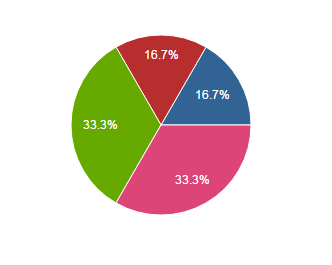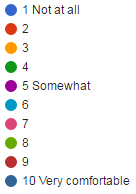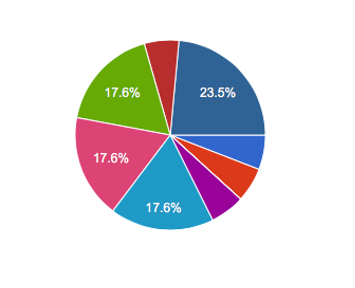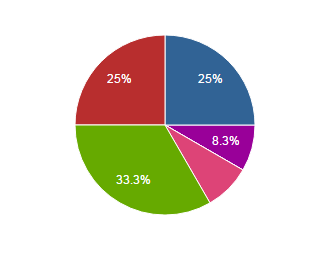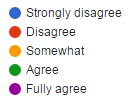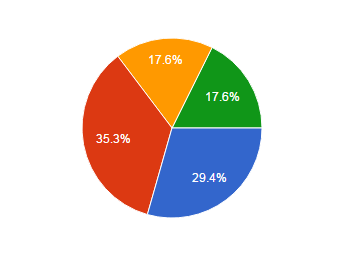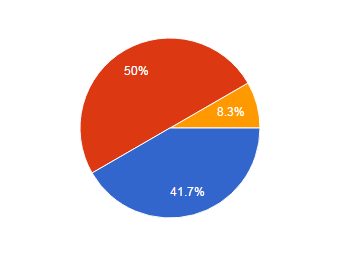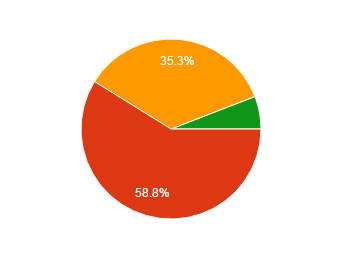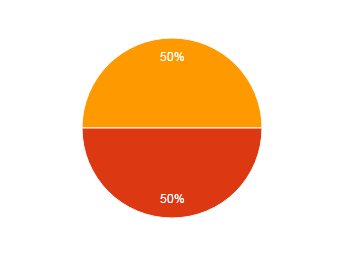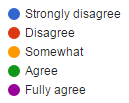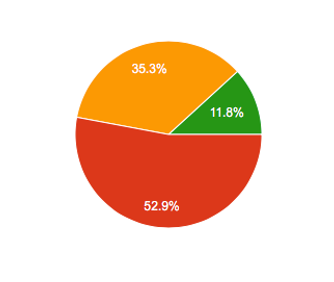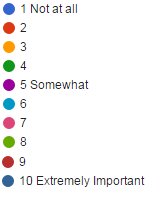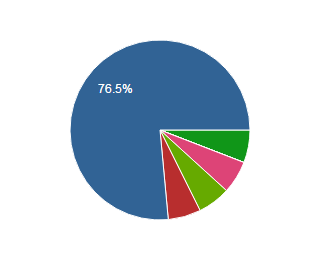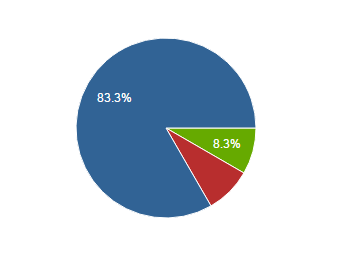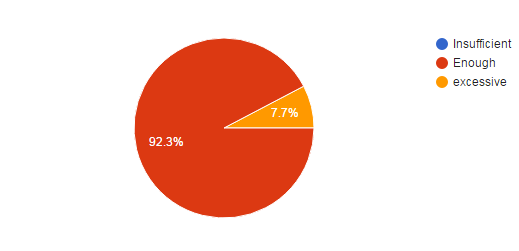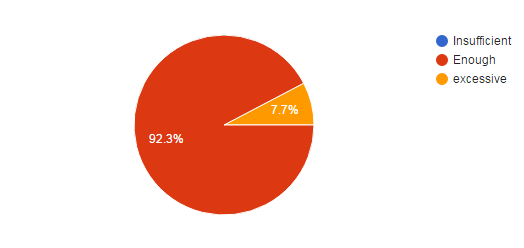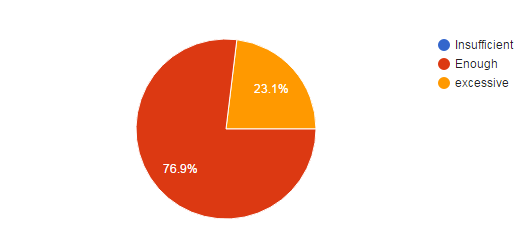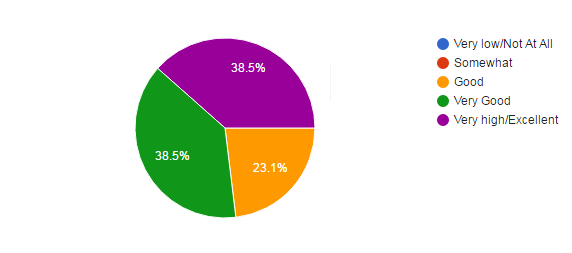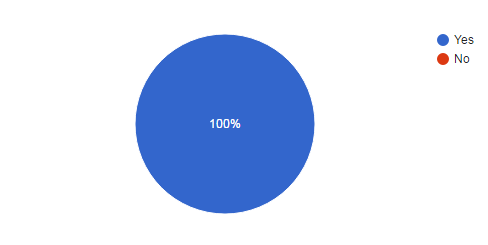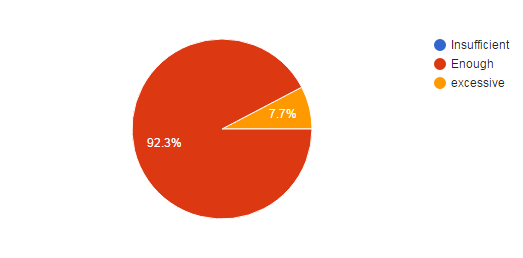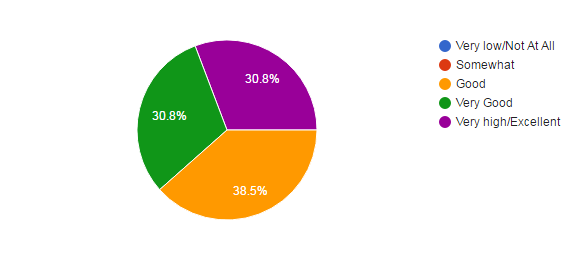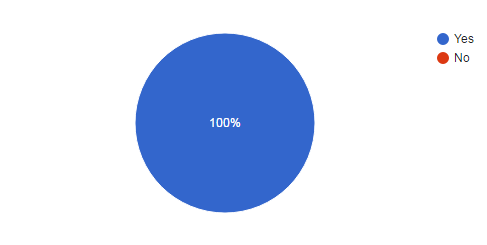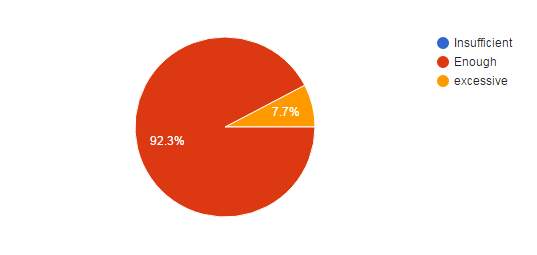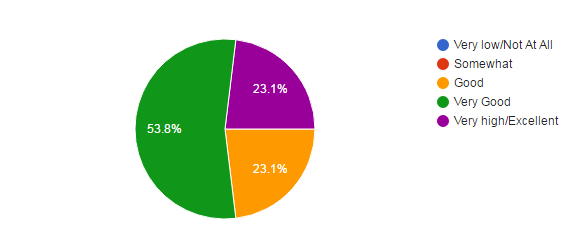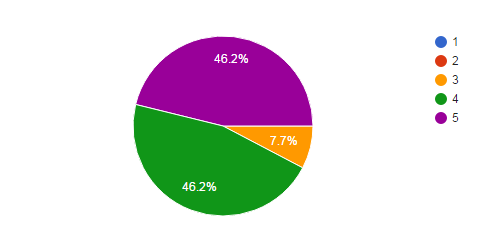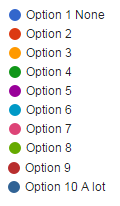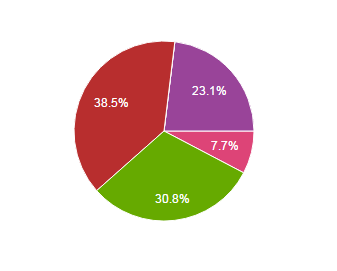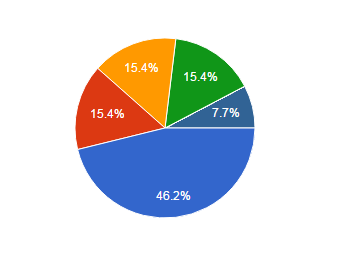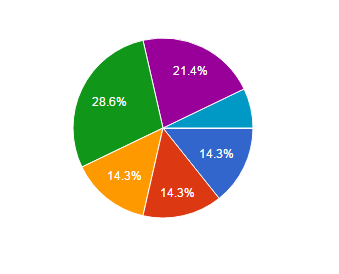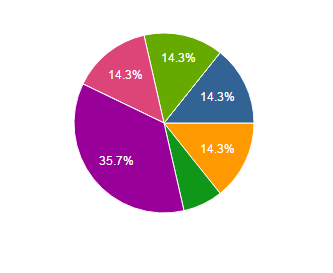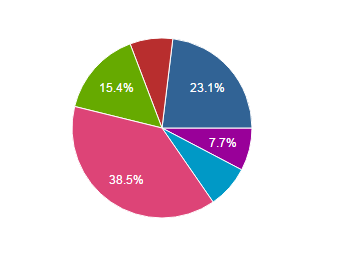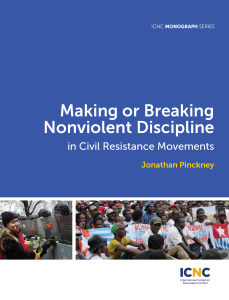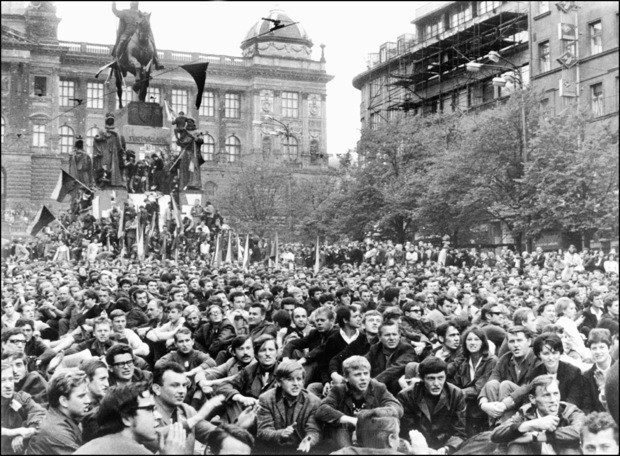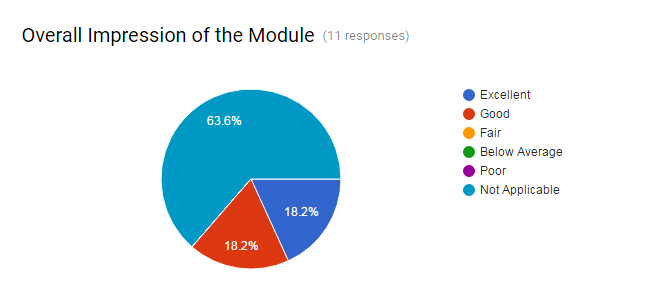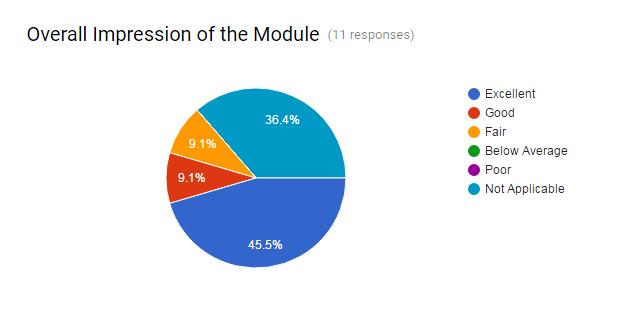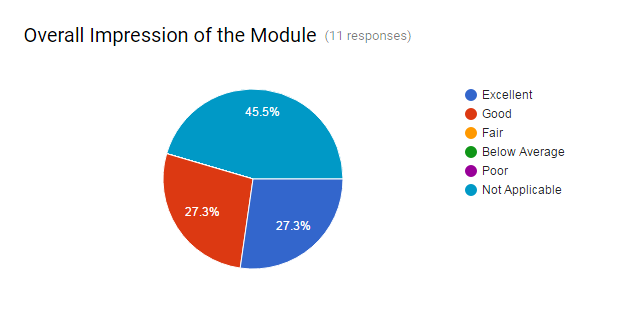Dictatorships and Civil Resistance in the 21st Century: A course taught by ICNC Curriculum Fellow 2016
 Clay Fuller, the ICNC Curriculum Fellow, developed, offered and moderated a classroom-based course on civil resistance in Fall 2016 at the University of South Carolina as part of the ICNC Curriculum Fellowship. The course was conducted at the University of South Carolina, Columbia, South Carolina.
Clay Fuller, the ICNC Curriculum Fellow, developed, offered and moderated a classroom-based course on civil resistance in Fall 2016 at the University of South Carolina as part of the ICNC Curriculum Fellowship. The course was conducted at the University of South Carolina, Columbia, South Carolina.
The information featured below was submitted as part of the fellowship requirement for classroom-based course that, among others, required a detailed course proposal with clearly developed sections on civil resistance, assigned readings, assignments relevant to the subject matter and evaluation tools.
Learn more by clicking on the topic links:
- About the Curriculum Fellow
- Course Abstract
- Course Structure
- Assignments
- Course Evaluation
- Learning Gains Survey Results
Section I: Summary Statistics
Section II: Discussion of the Survey Results
Section III: Discussion of the Question-Specific Results
Section IV: Survey Template
Section IV: Granular Data
Go back to the main ICNC Curriculum Fellowship page.
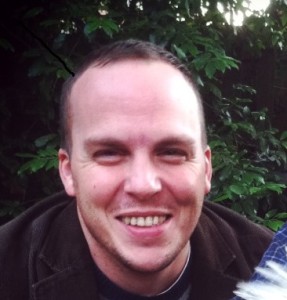 Clay Fuller is a research assistant for the Walker Institute of International and Area Studies, a sixth year PhD candidate (ABD) and adjunct instructor at the University of South Carolina, and he also teaches international relations online for Western Carolina University (NC). Clay studies non-democratic political institutions and the conditions under which these allow for liberal economic experimentation.The title of his dissertation is ‘Authoritarian Liberalism: Dictatorship in the 21st Century.’ His dissertation proposes an alternative assumption to the largely held belief that authoritarian regimes that grow the domestic economy and adopt semi-democratic political institutions will eventually lose control of the process and democratize. Essentially, modern authoritarian regimes are quite capable of adopting most of the necessary conditions for democracy while successfully avoiding the sufficient. His first field is comparative politics and second is international relations. Clay’s research resides in the nexus of these two fields and offers promising new data and insight concerning the use of special economic zones (SEZs) and sovereign wealth funds (SWFs). He regularly teaches an original topics course on modern dictatorships (to which this fellowship is applied) and regularly teaches basic international relations theory courses.
Clay Fuller is a research assistant for the Walker Institute of International and Area Studies, a sixth year PhD candidate (ABD) and adjunct instructor at the University of South Carolina, and he also teaches international relations online for Western Carolina University (NC). Clay studies non-democratic political institutions and the conditions under which these allow for liberal economic experimentation.The title of his dissertation is ‘Authoritarian Liberalism: Dictatorship in the 21st Century.’ His dissertation proposes an alternative assumption to the largely held belief that authoritarian regimes that grow the domestic economy and adopt semi-democratic political institutions will eventually lose control of the process and democratize. Essentially, modern authoritarian regimes are quite capable of adopting most of the necessary conditions for democracy while successfully avoiding the sufficient. His first field is comparative politics and second is international relations. Clay’s research resides in the nexus of these two fields and offers promising new data and insight concerning the use of special economic zones (SEZs) and sovereign wealth funds (SWFs). He regularly teaches an original topics course on modern dictatorships (to which this fellowship is applied) and regularly teaches basic international relations theory courses.
This political science course combines the traditionally domestic and/or area focus of comparative politics with the global and/or interstate levels of analysis associated with international relations. Authoritarianism, neo-authoritarianism, soft authoritarianism, dictatorship, monarchy, autocracy, totalitarianism, single-party regimes, military juntas, and the all-encompassing ‘non-democracy’ are merely a few of the many names given to world’s oldest and most common form of government. Despite ‘waves of democratization,’ in 2015 Freedom House reported that 55% of the world’s countries and 60% of the world’s population are not fully “free.” They also currently report a steady decline in freedom around the world for the entire past decade (freedom measured by civil liberties and political rights). This class explains and explores what these data and terminology mean, the methodologies used to generate these stats, and the major theoretical explanations for the continued survival of non-democracies and their leaders. In addition to learning the various theories concerning non-democratic survival, there are three other components to the course: 1) a section on data collection in dictatorships, 2) a semester-long computer simulation of the fall of a dictatorship to a civil resistance campaign, and 3) a large segment on civil resistance including its history, strategies, and tactics. It is actually not very difficult to remove a dictator from office relative to the difficulty of building a democratic society. The aim of this course is not only to educate students about the 80+ non-democratic regimes that exist today, but also to inspire students to learn more about the front end of the democratization process (removal of the dictator or regime) while simultaneously warning them about the pitfalls that face the group that replaces the regime.
The civil resistance units in this course were presented over the last three weeks of the semester. We followed the approved syllabus in the execution of the class, especially in regards to the civil resistance modules. Class goals were met through lecture, discussion, videos, on-line discussion, writing assignments, and a guest speaker. Evaluation was done based upon evidence of reading and participation.Before beginning the section on civil resistance, we did an in-class simulation of the fall of a dictatorship. It is a role-playing strategy game developed by a professor in Boston. It explores strategies between the ruling coalition and the people in a fictional dictatorship (like the People Power game, but this is in-class and in-person). The in-class simulation does not incorporate civil resistance tactics; however, it makes a great transition into the civil resistance section of the class because it exposes the dynamics that make a dictator susceptible to removal and fires up the imaginations of the students. The students always enjoy and have fun with this simulation. In future iterations, I plan to do the simulation a second time, incorporating nonviolent strategies in the player profiles.
The main assignments was a paper that each student wrote either 1) explaining and analyzing a historical nonviolent resistance movement using the assigned readings or 2) identifying a current situation where a nonviolent resistance movement could be effective and evaluating the prospects of such a plan (using the assigned readings). One extra assignment was added to encourage further reading. Students were offered extra points to create a “tweet” and a “hashtag” for specific readings and then write a paragraph explaining what message the tweet was intended to convey. The students enjoyed this exercise and in future iterations I will be using it again in a more systematic way.
In sum, I think the students enjoyed and learned a lot from the civil resistance modules. I learned a lot as well. My experience with this bled into a related class that I taught this fall – Political Violence and Revolutions. In it, I gave my students the options to design a nonviolent resistance movement in the United States to fix the student loan problem. I first established with every student that there was a problem. I asked them to share their experiences and thoughts. They mostly expressed apathy or helplessness. Some even expressed resentment for people who complain about it (even though they also recognized it was a big problem). I then simply asked “what are you going to do about it?” Most said “nothing.” I then asked them what would happen if all 50 million+ students and the millions more paying off student loans simply refused to make any more payments. I could tell that many had never even considered this. They became excited. Many tried to rationalize by saying that it would ruin their credit rating. I countered by asking them how that logic works.Many were struck by the concept of power through consent (we were studying the Color Revolutions at the time). Many wrote papers planning a student-led nonviolent movement to fix the student loan problem. I have found that if framed correctly, nonviolent struggles are very attractive to US college students.
Learning Gains Survey Results:
Clay distributed pre-seminar and post-seminar surveys to measure gains in learning progress among course participants. Included below are the graphed responses to selected questions from the surveys. In general, they illustrate a positive trend in learning gains achieved by the participants as a result of the course. The survey results and questions are displayed and briefly analyzed in descriptive form. The survey was given on the second day of class and then again on the last day of class during the fall semester of 2016. The raw data (in .csv form) is available for the use of ICNC staff. Confidentiality of respondents is strictly preserved. The data contains two identification markers. Each student has a randomized identification number (id) that matches across pre and post survey results. Each id number matches with another indicator of whether the student is male or female (female = 0, male = 1). There are 40 subjects – 21 males, 19 females. They were mostly juniors and seniors. ~75% of the class plans on a law degree. The analysis is split into four sections explained below.
SECTION I: Summary Statistics of Raw Data(Note: Questions 10 and 11 are nominal and results are discussed in section III.)
SECTION II: General Discussion about Survey Results
In general, the students had learning gains across all questions. The standard deviation decreases in the post-survey results across all continuous answers except questions 8 (list of tactics and strategies) and 9 (list of CRMs). The decrease in the standard deviation in questions 1-7 implies that the teacher was effective in conveying coherent knowledge on the subject matter to all students. The increase in standard deviations for questions 8 and 9 may imply that some students had a stronger interest in the subject and did more of the readings and independent research than other students.All survey instruments can be improved. A few suggestions for this one would be to change up the words under the numerical scales to possibly increase variation in answers (i.e. more specificity). Several students suggested that some questions could be more specific (for example, questions 9 and 10 should specify whether or not it is referring to historical or modern (or all) examples. Respondent descriptive questions would be helpful for a deeper analysis (i.e. race, age, student standing, major, etc.).I think that a standardized survey instrument for all instructors can be fashioned out of this first cut. A standardized instrument could help the ICNC clearly identify where its strengths and weaknesses are in the teaching curriculum program and other programs. Identifying strengths and weaknesses would help the ICNC make an already strong program even more effective.
SECTION III: Discussion of Question-Specific Results
SECTION IV: Granular Data Demonstration
The raw data are displayed below so the reader may see variation across individual students.
Go back to the main ICNC Curriculum Fellowship page.
Tunisians protest against returning militants
Zimbabwe: Tajamuka movement vows more anti-Mugabe protests in 2017
Honduras: Being a human rights defender in one of the deadliest countries on Earth
Hope for the Central American Spring
Syria: Women continue resistance against fascism, imperialism, and patriarchy
Strategic Nonviolent Action, Peacemaking, Community Policing: A course taught by ICNC Curriculum Fellow 2016
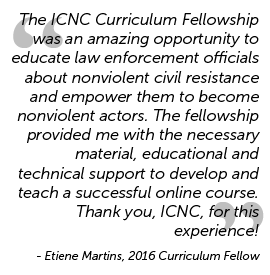 An online course on civil resistance created and moderated by Etiene Martins, developed with the support of the ICNC Curriculum Fellowship Program.
An online course on civil resistance created and moderated by Etiene Martins, developed with the support of the ICNC Curriculum Fellowship Program.
Learn more by clicking on the topic links:
Go back to the main ICNC Curriculum Fellowship page.
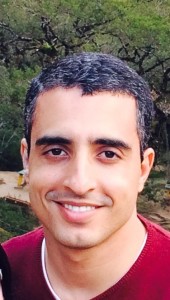 Etiene Martins is a Brazilian Federal Judge and a former police officer. He was a police officer for 16 years at Rio de Janeiro State, Brazil, and served at its Legal Department. In 2014, he was appointed Federal Judge and, currently, serves at the 4th Federal Court of Guarulhos City, District of São Paulo. He holds a B.A and a M.A in Public Security. In 2008, he earned LLB from the Federal University of the State of Rio de Janeiro. Since November 2015, Etiene Martins has been Professor of Constitutional Law and International Law at Enfase Institute (Brazil). Etiene has additionally started teaching Criminal Law at the D. João VI Police Academy. Etiene is active in the field of civil resistance training. He is a Kingian Nonviolence Conflict Resolution Co-Trainer affiliated with the Center for Nonviolence & Peace Studies (University of Rhode Island) In 2011, he attended the Kingian Nonviolence Training – Level I (University of Rhode Island) and, in 2015, the Fletcher Summer Institute on the Advanced Study of Nonviolent Conflict. In June this year, he will embark on the “Kingian Nonviolence Training – Level II – ADVANCED TRAINING in Leadership, Organization, Mobilization” at the University of Rhode Island. He is the author of the chapter “Law, Violence, and Public Security: Martin Luther King Jr.’s Philosophy Applied” published in the book Kingian Nonviolence: Applications for International & Institutional Change, 2015.
Etiene Martins is a Brazilian Federal Judge and a former police officer. He was a police officer for 16 years at Rio de Janeiro State, Brazil, and served at its Legal Department. In 2014, he was appointed Federal Judge and, currently, serves at the 4th Federal Court of Guarulhos City, District of São Paulo. He holds a B.A and a M.A in Public Security. In 2008, he earned LLB from the Federal University of the State of Rio de Janeiro. Since November 2015, Etiene Martins has been Professor of Constitutional Law and International Law at Enfase Institute (Brazil). Etiene has additionally started teaching Criminal Law at the D. João VI Police Academy. Etiene is active in the field of civil resistance training. He is a Kingian Nonviolence Conflict Resolution Co-Trainer affiliated with the Center for Nonviolence & Peace Studies (University of Rhode Island) In 2011, he attended the Kingian Nonviolence Training – Level I (University of Rhode Island) and, in 2015, the Fletcher Summer Institute on the Advanced Study of Nonviolent Conflict. In June this year, he will embark on the “Kingian Nonviolence Training – Level II – ADVANCED TRAINING in Leadership, Organization, Mobilization” at the University of Rhode Island. He is the author of the chapter “Law, Violence, and Public Security: Martin Luther King Jr.’s Philosophy Applied” published in the book Kingian Nonviolence: Applications for International & Institutional Change, 2015.
Course Abstract: This is an online seminar that aims to introduce police officers to ideas and concepts of civil resistance scholarship and practice, and to show how important social and political changes can be brought about by nonviolent actions. The course also intends to make participants aware of how civil resistance campaigns can help to reduce violence and enforce the rule of law. Since civil resistance campaigns can play such an important role in fighting corrupt practices, state abuses and strengthening rule of law, police would benefit from understanding and gaining greater insight from the field of civil resistance studies. The course aims to teach its participants how to identify civil resistance campaigns, deconstruct misconceptions about civil resistance actions and nonviolent movements, and how to constructively work with activists and civil resistance campaigns. The course consists of five components: 1) an introduction to civil resistance through a historical and practical perspective; 2) an examination of nonviolent action in history, focusing on the Martin Luther King campaign; 3) a look into the strategies and skills that create successful civil resistance movements; 4) applying nonviolent action to policing; and 5) an exploration of the future of civil resistance. Collectively, these components examine the proponents, philosophies and techniques of nonviolent action in transforming violent conflicts into more constructive nonviolent contentions that will benefit resolution of personal interpersonal, societal, and international conflicts.
Selected Learning Gains Survey and Final Evaluation Results
Learning Gains Survey Results:
Etiene distributed pre-seminar and post-seminar surveys to measure gains in learning progress among course participants. Included below are the graphed responses to selected questions from the surveys. In general, they illustrate a positive trend in learning gains achieved by the participants as a result of the course.
1. On the scale below, circle the choice that best represents your current knowledge of civil resistance and nonviolent movements. (Left: Pre-Seminar Results, Right: Post-Seminar Results)
Explanation: In the Pre-Seminar LGS, only 17.6% students felt that they had a very strong knowledge base (8-10) of civil resistance and nonviolent movements. In the Post-Seminar LGS, 66.7% of participants reported having a strong knowledge base on the subject.
2. On the scale below, identify your comfort level in speaking about Community Policing. (Left: Pre-Seminar Results, Right: Post-Seminar Results)
Explanation: In the Pre-Seminar LGS, 11.8% of participants reported having a very low comfort level in speaking about community policing (1-2). In the Post-Seminar LGS, 0% of participants reported having a very low comfort level and 83.3% reported having a very high comfort level (8-10).
3. On the scale below, which choice best represents your view that revolutions against brutal regimes (dictatorships, for instance) can succeed only if revolutionaries retain the option to use violent means? (Left: Pre-Seminar Results, Right: Post-Seminar Results)
Explanation: In the Pre-Seminar LGS, 17.6% of participants held the view that revolutions against brutal regimes can succeed only if revolutionaries retain the option to use violent means. In the Post-Seminar LGS, 0% of participants maintained that view and 91.7% disagreed or strongly disagreed with that view.
4. On the scale below, which choice best represents your view that protests, marches, and demonstrations in Brazil are violent (consider the last 10 years)? (Left: Pre-Seminar Results, Right: Post-Seminar Results)
Explanation: In the Pre-Seminar LGS, 5.9% of participants believed that protests, marches, and demonstrations in Brazil are always violent. However, in the Post-Seminar LGS, no participants reported maintaining that view.
5. On the scale below, circle the number that best represents your view that movements/campaigns that face repression must fail. (Left: Pre-Seminar Results, Right: Post-Seminar Results)
Explanation: In the Pre-Seminar LGS, no participants strongly disagreed that movements/campaigns that face repression must fail. In the Post-Seminar LGS, 16.7% of participants strongly disagreed that such movements must fail.
6. On the scale below, circle the number that best represents your view about how important you think strategic planning and leadership are in policing. (Left: Pre-Seminar Results, Right: Post-Seminar Results)
Explanation: In the Post-Seminar LGS, 83.3% of the participants thought that strategic planning and leadership in (nonviolent) policing are important, which was an increase by almost 7% in comparison with the result (76.5%) for the same question in the Post-Seminar LGS.
Final Course Evaluation Results:
Included below are graphed responses to selected questions from the Final Course Evaluation.
Module 1: Introduction to Nonviolence
This module introduces the main concepts and ideas of civil resistance. It reflects on its effectiveness and its power to overcome adversarial conditions.
The amount of study material provided in this module was:
Relevance to your interests or work:
Would you recommend this session be included in a similar program in the future?
Module 2: Civil Resistance in History: Martin Luther King
This module introduces Kingian Nonviolence and discusses the Kingian framework for conflict reconciliation, management, mediation, and arbitration. It includes analysis of the different types and levels of conflict, and how they escalate and deescalate.
The amount of study material provided in this module was:
Relevance to your interests or work:
Would you recommend this session be included in a similar program in the future?
Module 3: Leadership, Negotiation and Strategy
This module aims to empower participants with knowledge to become better leaders. It discusses BATNA (Best Alternative to a Negotiated Agreement) and the importance of unity, planning and nonviolent discipline in developing and leading a movement.
The amount of study material provided in this module was:
Relevance to your interests or work:
Would you recommend this session be included in a similar program in the future?
Module 4: Nonviolence Applied to Policing
This module analyzes why people are violent. It discusses negotiation, mediation and conflict resolution. It covers community policing and its definition, challenges and application.
The amount of study material provided in this module was:
Relevance to your interests or work:
Would you recommend this session be included in a similar program in the future?
Module 5: The Future of Civil Resistance
This module discusses ways that external non-state actors can support campaigns and civil resistance, the police as a nonviolent actor, the importance of communication and media strategies for successful nonviolent resistance movements, and different roles of technologies in civil resistance struggles.
The amount of study material provided in this module was:
Relevance to your interests or work:
Would you recommend this session be included in a similar program in the future?
General Questions about Educational Content:
Which Module was the most important for you?
Overall so far, the quality of the content has been: (Scale: 1 = very low; 5 = very high)
Go back to the main ICNC Curriculum Fellowship page.
Introduction to Civil Resistance: History and Strategies of Nonviolent Struggle: A course taught by ICNC Curriculum Fellow 2016
 Lilit Makunts, an ICNC Curriculum Fellow, developed, offered and moderated an online course on the introduction to civil resistance in Fall 2016 as part of the ICNC Curriculum Fellowship. The course was conducted on the ICNC Moodle platform.
Lilit Makunts, an ICNC Curriculum Fellow, developed, offered and moderated an online course on the introduction to civil resistance in Fall 2016 as part of the ICNC Curriculum Fellowship. The course was conducted on the ICNC Moodle platform.
The information featured below was submitted as part of the fellowship requirement that, among others, included creating a detailed course proposal, developing online content, designing evaluation tools, selecting participants and extensive moderation throughout the course.
Learn more by clicking on the topic links:
- About the Curriculum Fellow
- Course Abstract
- Learning Gains Survey Results
- Final Course Evaluation Results
- Selected Testimonials
- Useful Tips from Participants for Course Success
Go back to the main ICNC Curriculum Fellowship page.
Lilit Maku nts is currently an Associate Professor at Russian-Armenian University in Yerevan. She earned her Ph.D. in Cognitive Linguistics specializing in Political Discourse. She teaches Sociolinguistics, Cognitive Linguistics, and Discourse Analysis. After attending the Fletcher Summer Institute for the Advanced Study of Nonviolent Conflict in 2015, she initiated an academic course on Civil Resistance in the Department of Political Science this fall.
nts is currently an Associate Professor at Russian-Armenian University in Yerevan. She earned her Ph.D. in Cognitive Linguistics specializing in Political Discourse. She teaches Sociolinguistics, Cognitive Linguistics, and Discourse Analysis. After attending the Fletcher Summer Institute for the Advanced Study of Nonviolent Conflict in 2015, she initiated an academic course on Civil Resistance in the Department of Political Science this fall.
Still a student, she was very actively engaged in civic initiatives. Her aspiration for democratic changes in Armenia made her enter politics in 2004 and try to promote universal values. However, after about 8 years as a political board member in the Liberal Party of Armenia and the head of the youth organization (2004-2012) she realized that, without civic education and the acknowledgment of people power among society, no substantial democratic changes can take place. This was the major reason she quit political activity and started working with civil society groups and individuals. Along with academic teaching, she works as a trainer on different civil society platforms.
Course Abstract: This is an online seminar that aims to provide civil society representatives, social/political activists and students with basic knowledge of civil resistance history as well as to introduce them to strategies and tactics that are employed worldwide to make nonviolent resistance effective. The course intends to discuss various cases of nonviolent campaigns and movements and reflect on their efficiency by drawing parallels across local contexts. The course will begin with an introduction to civil resistance and its historical background and will discuss its common misconceptions. It will analyze the reasons why nonviolent campaigns succeed more often than violent ones and will touch upon the idea of people power and how it works. The seminar will further discuss strategic frameworks for analyzing campaigns and movements, as well as explore issues related to innovative and creative tactical choice. Cultural resistance will then be discussed as a creative way to challenge and fight oppression. The last component of the online course will be devoted to the discussion of the role of negotiations in civil resistance and the options regarding their application in nonviolent struggles in Armenia.
Learning Gains Survey Results
The Learning Gains Survey aims to measure knowledge gains among course participants. Participants take the Pre-Seminar Survey at the beginning of the course and take an identical survey (Post-Seminar) at the end of the course. Included below are the graphed responses to selected questions from the Pre-Seminar and Post-Seminar Surveys. In general, the surveys illustrate a positive trend in the knowledge gains achieved by participants as a result of the course.
1. On the scale below, grade your current knowledge of civil resistance or nonviolent movements. (Left: Pre-Seminar Results, Right: Post-Seminar Results)
Explanation: In the Pre-Seminar LGS, more than one third of participants (35.7% selected option 3) felt they had relatively little knowledge of civil resistance or nonviolent movements and zero participants ranked their knowledge above a score of 7. In the Post-Seminar LGS, close to 85% of participants felt that they had a very high level of knowledge on the subject (8-10).
2. On the scale below, identify your comfort level in speaking to others about civil resistance or nonviolent movements. (Left: Pre-Seminar Results, Right: Post-Seminar Results)
Explanation: In the Pre-Seminar LGS, participants reported a wide range of comfort levels when speaking about civil resistance or nonviolent movements; some participants ranked their level as very low and others as very high. [Participants might have understood this question not only in relation to their knowledge of/familiarity with the subject but also in relation to their willingness to speak about it with others in a relatively closed society]. The results of the Post-Seminar LGS indicate that all participants now feel confident in their ability to speak about this topic, with 77% ranking their comfort level as a 9 or a 10 and the remaining 23% ranking their comfort level as an 8.
3. On the scale below, select the number that best represents your knowledge on the history and effectiveness of nonviolent civil resistance. (Left: Pre-Seminar Results, Right: Post-Seminar Results)
Explanation: There is a clear growth in participants’ knowledge of the history and effectiveness of nonviolent civil resistance. In the Pre-Seminar LGS 42.9% of participants ranked their knowledge of this topic as low (3). However, in the Post-Seminar LGS 92.4% of participants ranked their knowledge as very high (8-10).
4. On the scale below, grade the effectiveness of nonviolent campaigns over the violent ones. (Left: Pre-Seminar Results, Right: Post-Seminar Results)
Explanation: In the Pre-Seminar LGS, participants were divided in their feelings of the effectiveness of nonviolent campaigns over violent ones. However, in the Post-Seminar LGS 69.3% of participants, no doubt informed by the readings and class discussions, reported that nonviolent campaigns can be highly effective, even more so than their violent counterparts.
5. On the scale below, select the number that best represents your view on the statement that movements that face repression cannot succeed. (Left: Pre-Seminar Results, Right: Post-Seminar Results)
Explanation: In the Post-Seminar LGS the number of participants who strongly disagreed that movements that face repression cannot succeed nearly doubled from 28.6% to 46.2%.
6. On the scale below, select the number that best reflects your view about how effective cultural resistance can be. (Left: Pre-Seminar Results, Right: Post-Seminar Results)
Explanation: The number of the participants who reported that cultural resistance can be highly effective (9-10) nearly doubled, from 35.7% in the Pre-Seminar LGS to 61.6% in the Post-Seminar LGS.
7. On the scale below, indicate the number that best represents your view on the statement that violent campaigns can be more effective for democratic transitions than nonviolent ones. (Left: Pre-Seminar Results, Right: Post-Seminar Results)
Explanation: The number of participants who felt strongly that violent campaigns cannot be more effective for democratic transitions than nonviolent ones, increased from 14.3% on the Pre-Seminar LGS to 23.1% on the Post-Seminar LGS (1).
8. On the scale below, indicate the number that best represents your opinion about how effective nonviolent movements are against repressive regimes. (Left: Pre-Seminar Results, Right: Post-Seminar Results)
Explanation: On the Pre-Seminar LGS, 28.6% of participants believed that nonviolent movements are very effective (8-10) against repressive regimes. The number of participants who held this view increased to 46.2% in the Post-Seminar LGS.
Final Course Evaluation Results:
Included below are graphed responses to selected questions from the Final Course Evaluation.
1. Course content was organized and planned (1: Strongly Disagree; 5: Strongly Agree)
2. The goals of the course and its modules were clear (1: Strongly Disagree; 5: Strongly Agree)
3. Course modules and content were timed and sequenced well (1: Strongly Disagree; 5: Strongly Agree)
4. Course content was comprehensive and balanced, and topics were well selected (1: Strongly Disagree; 5: Strongly Agree)
5. Taking this online course was a positive experience (1: Strongly Disagree; 5: Strongly Agree)
6. I now have more knowledge about civil resistance and its various topics than I had before taking the course (1: Strongly Disagree; 5: Strongly Agree)
7. I have reviewed some misconceptions that I had on nonviolent resistance as a result of the course (1: Strongly Disagree; 5: Strongly Agree)
8. I found the module on “Developing Strategy and Tactics” useful (1: Strongly Disagree; 5: Strongly Agree)
9. I consider analyzing the spectrum of allies to be important for planning (1: Strongly Disagree; 5: Strongly Agree)
10. I found weekly module summaries shared by the course moderator relevant and helpful (1: Strongly Disagree; 5: Strongly Agree)
11. Course moderator offered useful comments (1: Strongly Disagree; 5: Strongly Agree)
12. I learned about civil resistance from other course participants (1: Strongly Disagree; 5: Strongly Agree)
13. Course content matched my interests and professional needs (1: Strongly Disagree; 5: Strongly Agree)
14. The course met or exceeded my expectations (1: Strongly Disagree; 5: Strongly Agree)
15. I would recommend this course to other people (1: Strongly Disagree; 5: Strongly Agree)
16. How would you assess your own engagement with the course material, including participation in the course forums? (on a scale from 1 to 5)
17. I feel my knowledge on nonviolent resistance can be resourceful for researchers, activists and other interest groups (1: Strongly Disagree; 5: Strongly Agree)
- “Initially, I was very enthusiastic about this online course and, now, my expectations are justified…..Before the course I was very pessimistic about the changes that one can make in their own country, but now it is quite the opposite picture. The examples, the people, the achievements were so influential, that you could not help believing in its power. The most valuable part for me were the discussions, because here you can, directly, feel the great concerns of different people on one issue, and discussions, in that sense, were the beginning of something new.”
- “For me the part of “Developing Strategies and Tactics” was the most interesting and important, because it shares theoretical knowledge on very practical part of social/political life.”
- “Each module of the course was valuable and in each step we got a new knowledge. In future I will use my knowledge from the course. She is a great moderator because she constantly reminds us that she is willing to listen to anything we have to say and discuss.”
- “I liked the discussions in the forums, it was great to know that there are people who value the idea of non-violent civil resistance.”
- “I liked it and everything was balanced. I think all of modules are valuable and they can’t be separated.”
- “First of all the whole course was inspiring and motivating, which, I think, is quite necessary for today’s generation, particularly in our country. Most of all I liked the 6th module, ‘Cultural Resistance’, as it seemed to be the best way of a nonviolent civil movement in many ways.”
- “I got very positive impression from the course, because I learned a lot of new things about non-violent civil resistance. I especially liked when we studied different successful cases of civil resistance all around the world.”
- “I’ll mention 3 topics which really impress me. They are ‘Developing Strategy and Tactics’, ‘Cultural Resistance’, and ‘Negotiations and Civil Resistance’
- “The course was very useful for me. I particularly enjoyed the interaction between participants in the forums.”
Useful Tips from Participants for Course Success
- Time management and self-commitment
- Spend 1.5 – 2 hours per day engaging in the course
- Before watching and reading materials, review the forum discussion questions
- Do not leave tasks to the last day of each module
- Be as attentive and active as possible; taking this course and reviewing this literature is a duty
- Create a schedule
- Read material every day little by little
- Keep up with forum discussions that other participants lead; it is the best way to remember all the course details and to apply various points of view
Go back to the main ICNC Curriculum Fellowship page.
China: Salman Rushdie leads World Human Rights day protest for Chinese writers
West Papua: Major demonstrations staged in Wamena and Manokwari
Russia/Ukraine: Crimean Tatar activist says world is silent as Russia persecutes his people
Mexico: Environmental grassroots protest in a repressive context
Ethiopia: The importance of nonviolent resistance in the Oromo struggle
Making or Breaking Nonviolent Discipline in Civil Resistance Movements
This Academic Webinar took place on Tuesday, January 17, 2017 at 12 p.m. EST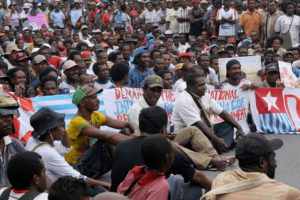
This webinar was presented by Jonathan Pinckney
Watch the webinar below:
Webinar content:
1. Introduction of the Speaker: 00:00-00:52
2. Presentation: 00:52- 29:20
3. Questions and Answers: 29:20-52:29
Two different polls were conducted among the participants during the webinar. The polls asked the following questions:
- In your opinion, how important is nonviolent discipline for the success of a civil resistance movement?
- In your view, what factors increase nonviolent discipline in civil resistance movements?
Check the webinar recording above to see the polls’ results that reflected the views’ of the webinar participants and compare them with the quantitative and qualitative findings of the research presented by the speaker.
Webinar summary:
How can we understand when nonviolent movements will stay nonviolent? When are they likely to break down into violence? In this monograph, Jonathan Pinckney analyzes both what promotes and undermines nonviolent discipline in civil resistance movements. Combining quantitative research on thousands of nonviolent and violent actions with a detailed comparison of three relevant case studies of civil resistance during the “Color Revolutions”, Pinckney’s analysis provides important lessons for activists and organizers on the front lines, as well as for practitioners whose work may impact the outcomes of nonviolent struggles. We learn how repression consistently induces violence, as do government concessions. On the flip side, we see that structuring a campaign in an inclusive and non-hierarchical way is conducive to greater nonviolent discipline.
Responses to questions not answered during the scheduled webinar time:
Participant comment/question: hanks for studying this topic. I’m in the US, and I’ve dealt with people who come to demonstrations and civil disobedience actions as participants in and advocates of “black bloc” style “diversity of tactics.” Many of the anti-corporate globalization mobilizations faced these challenges, and for a while even advocates of nonviolence seemed to try to split the difference with “black blocs.” But my perception is that this didn’t work (splitting the difference seemed to mean, in practice, rejecting what you call nonviolent discipline). And I think many advocates (the RANT collective, for example, I believe) reaffirmed advocacy for explicitly nonviolent agreements for demonstrations. I’m wondering, either in your case studies or your interest in the field, if you’ve studied the negotiation process between advocates and skeptics of explicitly nonviolent approaches.
Pinckney: This is definitely a major challenge for several movements, and it’s very typical to see back and forth struggles between groups who are committed to nonviolence and those who either explicitly espouse violence or at least want to keep their options open to a “diversity of tactics,” as you mention. I haven’t studied that negotiation process in depth, but I can tell that it’s certainly difficult. Some movements attempt to distance themselves from groups that don’t explicitly commit to nonviolence, others try to talk them into moderating or limiting their violent activities. It’s a process that’s very specific to the particular case, depending on what the power balance is between different groups, their connection to the larger social-political environment, etc.
Participant comment/question: I’m a little confused about your statistical tests, including the “statistical results” column. Were you testing these three cases alone, or bringing in other examples as well?
Pinckney: For my statistical testing I looked at around 18,000 actions by hundreds of different campaigns in 14 countries over a period of around twenty years. The countries were completely different than the three countries that I examined for the comparative cases section. That’s why you might have noticed that sometimes the findings were different for the statistical testing than for the three [in-depth] cases. I was particularly convinced by findings where I could see a pattern both in the statistical testing and in the three cases. I discuss where the data for the statistical testing comes from in great detail in my ICNC monograph.
Presenter

Jonathan Pinckney is a PhD candidate at the Josef Korbel School of International Studies, University of Denver, and a research fellow at the Sie Cheou-Kang Center for International Security and Diplomacy, where he supervises the Nonviolent and Violent Campaigns and Outcomes (NAVCO) 3.0 project. His research centers on nonviolent political contention in non-democracies, which special focus on the role of civil resistance in democratization. Jonathan’s work has been published in the Journal of Peace Research, Foreign Policy Magazine’s Democracy Lab, and the Encyclopedia of Social and Behavioral Sciences. Jonathan received his BA in International Affairs from Gordon College, graduating summa cum laude with special honors, and his MA from the Korbel School in 2014. He was a 2012 recipient of the Korbel School’s Sie Fellowship.
Making or Breaking Nonviolent Discipline in Civil Resistance Movements monograph
Recommended Readings:
- Hardy Merriman. “The Trifecta of Civil Resistance.”
- Liesel Mitchell. “Nonviolent Discipline: A Comparative Analysis of Tiananmen Square 1989 and Gwangju 1980.”
- Gene Sharp. “How Nonviolent Struggle Works.” (A shorter version of The Politics of Nonviolent Action that is available online) Chapter 11: Solidarity and Discipline to Fight Repression.
Upcoming ICNC webinars. For the full list of upcoming ICNC webinars go here.
Past ICNC webinars. Please visit the ICNC Webinar Digest to hear all ICNC webinars delivered between 2010-2016 in an easily accessible format.
National Nonviolent Defense Against Aggressor-States
This Academic Webinar took place on Wednesday, December 21, 2016 at 12 p.m. EST
This webinar was presented by Dr. Maciej Bartkowski
Watch the webinar below:
Webinar content:
1. Introduction of the Speaker: 00:00 – 00:55
2. Presentation: 00:56 – 49:52
3. Questions and Answers: 49:53 – 1:07:58
Four different polls were conducted among the participants during the webinar. The polls asked the following questions:
- What would you do if foreign troops invaded & occupied your town/city/region/country?
- In your view, how effective can nonviolent resistance against a powerful aggressor-state be?
- In your view, how effective can armed resistance against a powerful aggressor-state be?
- What resistance action would you join if your town/city/region/country was occupied by a brutal foreign regime?
Check the webinar recording above to see the polls’ results and compare them with the outcomes of the national surveys that were shown and discussed by the speaker.
Webinar Summary:
Historically, nonviolent resistance has proven to be more effective than armed insurrections against domestic authoritarian regimes. The relevance and applicability of civil resistance to fighting violent regimes at home are by now indisputable.
This scholarly, policy and practitioner confidence has yet to translate into the opinion that civil resistance can also be relevant and applicable for effective national defense against an aggressor-state. This webinar will elaborate on a national nonviolent defense as a viable means to counter external, overt and covert (hybrid) aggression and foreign occupation.
More specifically, the webinar will analyze the results of recent national surveys from Poland and Ukraine that show surprisingly large social capital among respective populations for civil resistance in case of violent foreign intrusion. It will also look at selected historical cases of nonviolent defense used spontaneously by the attacked societies and current efforts by Lithuania to integrate civil resistance into its defense policies and preparedness.
These analyses will show how nonviolent resistance strategies can be relevant for developing viable and effective national defenses against violent aggressor-states.
Presenter:
Dr. Maciej Bartkowski is the Senior Director for Education & Research at ICNC. At ICNC, Dr. Bartkowski manages academic programs for students, faculty, and educators that support curriculum-development, teaching, research, writing and study on civil resistance. He is editor of the ICNC Monograph series and the volume Recovering Nonviolent History: Civil Resistance in Liberation Struggles. He is also an adjunct faculty at Johns Hopkins University, Krieger School of Arts and Sciences and at Fletcher School of Law and Diplomacy. Read more
Relevant publications by Dr. Bartkowski:
- Countering Hybrid War. Civil Resistance as a National Defense Strategy, openDemocracy, May 2015. Available Online
- Nonviolent Civilian Defense to Counter Russian Hybrid Warfare, Critical Policy Issue Studies, Johns Hopkins University, March 2015. Available Online
- To Kill or Not to Kill: Ukrainians Opt for Nonviolent Civil Resistance, Political Violence @ A Glance, October 2015. Available Online
- The Kremlin’s “Protest Potential” Strategy, The HuffingtonPost, November 2016. Available Online
- Nonviolent Strategies to Defeat Totalitarians such as ISIS, openDemocracy, March 2016. Available Online
Brazil: Initiative seeks to create free labs for activists
Legacy of dissident movements could have lessons for today
Armenia: Female activists are reclaiming space in public life
Australian activists, dissenters, and whistleblowers feeling the heat
Sudanese opposition parties join call for civil disobedience
ICNC is Hiring
2014 ICNC Online Course: Civil Resistance and the Dynamics of Nonviolent Conflict
ICNC offered a moderated online course on civil resistance in partnership with the International Institute for Peace at Rutgers University Graduate School, which took place from October 14, 2014 to November 21, 2014.
Click on the following links to navigate: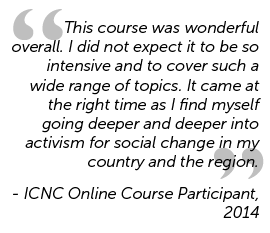
- Applications, admission and course participants
- Course moderation
- Course content
- Selected testimonials
- Useful tips from participants for course success
Applications, admission and course participants
ICNC received 86 applications and accepted 55 participants. Among those 55 participants, 23 countries of origin were represented including Israel, Pakistan, Venezuela, and Poland. The participant group was made up of activists, scholars, educators, and students.
Course facilitators included Dr. Maciej Bartkowski, Shaazka Beyerle, and Althea Middleton-Detzner.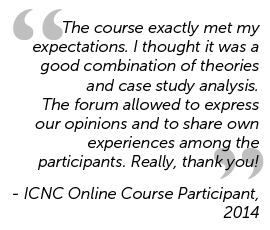
The online course consisted of an introduction module and five thematic modules. Each thematic module was released at the beginning of the week and the participants and moderators engaged in different forums of the module throughout the week. A detailed course outline is provided below. (Note: The selection of the ‘Not Applicable’ option indicates that the respondent did not participate in that particular module)
Module 1. Welcome and Introductions
Module 2. Foundation of Civil Resistance
- What civil resistance is, its dynamics, attributes, power of agency
- Explaining effectiveness of civil resistance: its record and why it was ignored in the past
Module 3. Deconstructing Misconceptions and Structural Determinism
- Common misconceptions and their harmful consequences
- Skills versus Conditions: underlying misconceptions, research findings (Freedom House study, Gaventa and Barrett), interplay between skills and conditions, Thomas Schelling quote
Module 4. Dynamics of Civil Resistance: Strategies and Tactics
- Nonviolent tactics and strategies (what they are/what is the difference between the two)
- Tools for tactical analysis
- Strategic sequencing of tactics (Nashville episode)
- Dilemma actions
- Backfire/paradox of oppression
- Defections
Module 5. Variety of topics [participants chose at least two out of six topics listed below]
- Nonviolent Resistance Against Violent Non-State Actors
- Gender Dynamics in Civil Resistance
- Violent Flank and Civil Resistance
- Unaccountable Exploitative Industry and Civil Resistance
- Grassroots Campaigns and Movements Impacting Corruption and Impunity
- Democratic Transition and Civil Resistance
5.1 Nonviolent Resistance Against Violent Non-State Actors:
If “Not Applicable” was selected it meant learners did not take part in reviewing and discussing this particular topic in Module 5, and instead chose a different one.
5.2 Gender Dynamics in Civil Resistance:
If “Not Applicable” was selected it meant learners did not take part in reviewing and discussing this particular topic in Module 5, and instead chose a different one.
5.3 Violent Flank and Civil Resistance:
If “Not Applicable” was selected it meant learners did not take part in reviewing and discussing this particular topic in Module 5, and instead chose a different one.
5.4 Unaccountable Exploitative Industry and Civil Resistance:
If “Not Applicable” was selected it meant learners did not take part in reviewing and discussing this particular topic in Module 5, and instead chose a different one.
5.5 Grassroots Campaigns and Movements Impacting Corruption and Impunity:
If “Not Applicable” was selected it meant learners did not take part in reviewing and discussing this particular topic in Module 5, and instead chose a different one.
5.6 Democratic Transition and Civil Resistance:
If “Not Applicable” was selected it meant learners did not take part in reviewing and discussing this particular topic in Module 5, and instead chose a different one.
Module 6
- Final Course Evaluations
“It was extremely knowledgeable and very concise and well organised in its structure. I could not have expected more…Very much impressed with the quality of lectures and course work and absolute brilliant administration and organisation by the ICNC Team.”
-ICNC Online Course Participant, 2014
“The course exactly met my expectations. I thought it was a good combination of theories and case study analysis. The forum allowed to express our opinions and to share own experiences among the participants. Really, thank you!!!”
-ICNC Online Course Participant, 2014
“This course was wonderful overall. I did not expect it to be intensive and to cover a wide range of topics. It came at the right time as I find myself going deeper and deeper in activism for social change in my country and region.”
-ICNC Online Course Participant, 2014
“My role models in nonviolence have been Mahatma Gandhi and Dr Martin Luther King both of whom advocated principled nonviolence yet were very strategic in the use of it. Without realizing it I had taken principled violence as the only form of violence and never considered those who use nonviolence for strategic purposes only. This understanding left me frustrated every time people turned away as I advocated for nonviolence. The course helped me get the message clearer and I will be able now to tell people correctly and draw more activists to adhere to our cause of nonviolent social change.”
-ICNC Online Course Participant, 2014
“I did not know the extent of women’s involvement in nonviolent movements. I knew it was substantial, but I had still underestimated just how powerful and effective women have been historically and presently in making nonviolence happen. Also, I was unaware of the number of instances in which folks used nonviolence, not because of an ideological commitment, but because it worked.”
-ICNC Online Course Participant, 2014
Useful tips from participants for course success
- Time management is key
- If you have internet access issues, plan work time efficiently
- Work a little everyday or pick certain days to dedicate large portions of time
- Explore the online course site in the beginning to understand all the tools
- Use your phone to read/work on the go
- Start discussions; ask questions
ICNC High School Curriculum Fellowships
 Interest in civil resistance movements and nonviolent action is rising among high school students. Whether driven by current events in their country, growing media attention that civil resistance movements are receiving, or other causes, opportunities need to be created for these students to follow their interest and pursue study of this field.
Interest in civil resistance movements and nonviolent action is rising among high school students. Whether driven by current events in their country, growing media attention that civil resistance movements are receiving, or other causes, opportunities need to be created for these students to follow their interest and pursue study of this field.
View the most recent call for High School Fellowships to learn more about the fellowship and requirements. A new call for applications is expected to be launched in the first quarter of every year.
Studying civil resistance movements and nonviolent action as an applied science and creative engagement can have numerous benefits for young students, including:
- Understanding new ways of engagement in making social, political, and economic change in their communities. This can lead to heightened engagement and a sense of empowerment.
- Preparing students for university-level study. There is a profusion of scholarly literature, and a growing number of courses on civil resistance offered at various universities in the areas of conflict, peace and security studies, political science, international relations, history, and sociology.
- Offering students general knowledge and skills that are relevant to future advanced studies in any of the broadly understood social sciences.
- For career-oriented students who know they want to pursue work in foreign policy, government, community organizing, journalism, advocacy, or civil society organizations, learning about civil resistance movements and nonviolent action can be a career-oriented learning opportunity. As this phenomenon increasingly shapes international affairs and domestic politics in countries around the world, government and civic actors are increasingly likely to encounter this phenomenon in their work. In such cases, knowledge about civil resistance movements is an important competency.
In Fall 2016, ICNC launched its first ever grant program for high school educators from around the world to support development and implementation of education on civil resistance movements and nonviolent action for high school students.
The first seven fellows of the program have been selected from the pool of excellent applicants who responded to the call. The fellows came from different parts of the world (Mauritania, Afghanistan, United States, South Africa, Hungary) and developed and thought civil resistance courses for the high school students in Winter, Spring and Summer of 2017.
View this year’s 2018 High School Curriculum Fellows:
View the final evaluations and learning assessments from the 2016 High School Curriculum Fellows:
- Ahmadullah Archiwal, High School Curriculum Fellow. Ahmadullah’s course evaluation & learning assessment
- Elizabeth “Betsy” Cepparulo, High School Curriculum Fellow. Betsy’s course evaluation & learning assessment
- Regina Feldman, High School Curriculum Fellow. Regina’s course evaluation & learning assessment



